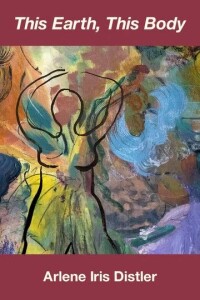
This new collection of poems embodies a way of being in this world. Bursting with generosity of spirit, Distler’s poems call us to appreciate even the smallest of joys and to have courage in dark times. (Full disclosure: The author is a friend and colleague of mine). She reminds us of “Rain . . . beating jazz on my roof” and of the “imperfect fruit” of an old apple tree near where a loved one’s ashes are scattered.
Distler does not shy away from the big questions, starting with a brilliant poem entitled “Remember dying.” Upon the untimely death of her husband, Distler must find a way to comprehend that eternal mystery.
We are not this flesh we call ourselves . . .
this seeming solid self only the sounding bell.Yet the world’s beauty is ours
to bear, and the austere does not call.
Her poems call to all our senses and all our philosophies, urging us to grasp life and to let it go.
She explores the uses of memory. There are poems about a childhood charm bracelet, an old yearbook, and a grandmother, only now seeing that the elderly woman may have been lost in “the long ago passage/between old world and new.” In one poem Distler revisits the early home shared with her husband, “where the seeds of my children were sown/among clover and high grass.” With powerful imagery she reveals what remains:
there’s only a burnt and bruised shell
yellow jackets in the cellar hole
chimney the only thing standing.
And the sky, as usual
brooding and hallowed.
The New England landscape is here, with its stone walls, blueberries, and pond peepers. In her hands, the natural world with its splendor and cruelty yields startling insights such as this when an owl “haughty as ice” seems to speak:
. . . Remember your nest
that spot you tend with bits of wood,
tufts of straw, feathers
you pluck from your breast.
There are sacrifices we make and stands we take. We experience love and loss, and—if we’re lucky—learn to see with new eyes. This collection brings together the moments of human experience in poems that surprise us on every page.
Whose poetry are you reading these days?

> Whose poetry are you reading these days?
The last couple/few weeks I find I’ve been doing a lot of re-reading.
One particular example is the Vermont poet Walter Hard. Hard wrote primarily in the ‘20s through the ‘40s, particularly in Vermont Life magazine. His pieces might more properly be called “vignettes”, consisting mostly of stories of small town Vermont life.
Hard published about a dozen book of poems, but sadly, it seems they’re all out of print. (I came across one of his books up at Bear Pond books, and over the years have managed to obtain copies of all of his books.). I really love his work.
Likewise —while in a narrative vein— I’ve recently been (re)reading the prose poems of Louis Jenkins.
(People who might not know Louis Jenkins may be aware of his work because the actor Mark Rylance has been known to recite poems by Jenkins as his acceptance speech for various of his [Rylance’s] acting awards. For example:
https://youtu.be/20lm7Ow9RSY. )
Also, the work of Gary Snyder (whose birthday, as it turns out, is today). But here, recently I’ve been reading primarily his essays and other prose.
Looking to the future, I see that one of very favorite poets, Jane Hirshfield, has a major New&Selected volume coming out in September (it’ll be something like 360 pages).
I’m *really* looking forward to that.
Wow. I’ve never heard of Walter Hard. I’ll have to try to find some of his work. Thank you for letting me know about Jane Hirshfield’s September book–that IS something to look forward to!